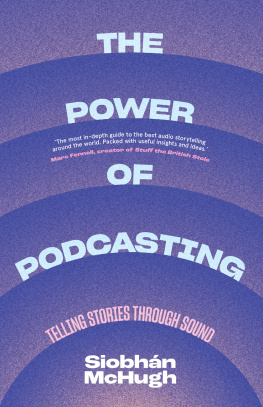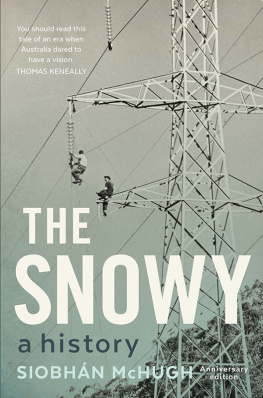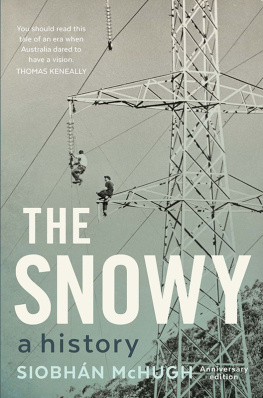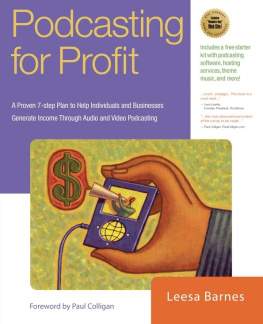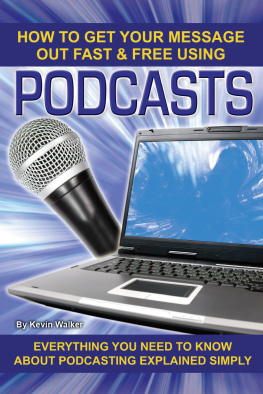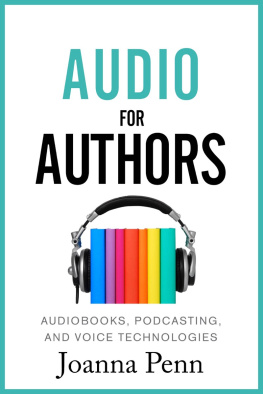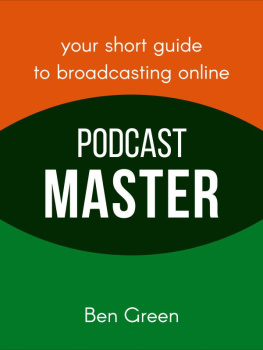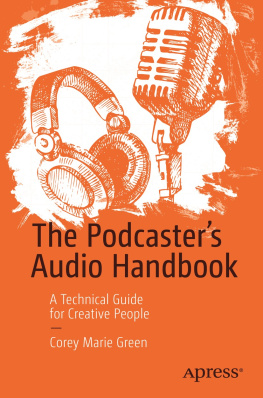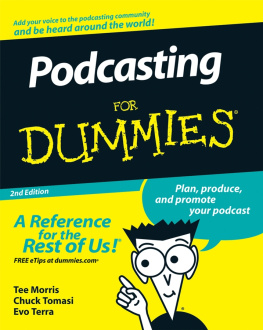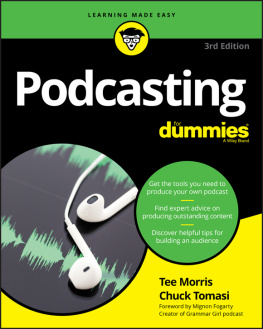CONTENTS
Page List
Guide

THE
POWER
OF
PODCASTING
SIOBHN McHUGH is an award-winning writer, documentary-maker, academic and podcast producer who has been telling audio stories for four decades. She has won six gold awards at New York Festivals for co-produced podcasts including Phoebes Fall, Wrong Skin and The Last Voyage of the Pong Su, and is consulting producer on The Greatest Menace, a queer true-crime podcast. Siobhn has published four books of social history, including The Snowy: A History, which won the Douglas Stewart Prize for Non-Fiction at the NSW Premiers Literary Awards. She is Honorary Associate Professor in Media and Communications at the University of Sydney and Honorary Associate Professor in Journalism at the University of Wollongong.
Essential reading for anyone aspiring to make memorable audio. This is the ultimate guide to podcasting from a master of the craft.
RICHARD BAKER, HOST OF THE LAST VOYAGE OF THE PONG SU
Much more than a how-to guide for aspiring podcasters A reminder of the power of sound and the huge potential of the podcast medium.
RICHARD BERRY, UNIVERSITY OF SUNDERLAND
Absolutely fascinating, and a terrific lesson in how to tell good stories. Whether you seek instruction, or simply to know why some podcasts are better than others, this book is for you. Considering how rapidly podcasting is developing, McHugh manages to keep it bang up to date, charting the latest trends and the ever-expanding honour roll of podcasts circulating around the world. For those looking for practical guidance in creating or improving their own podcasting, she populates the chapters with real, living, breathing people in all the highs and lows of their humanity, which is, after all, the secret to great radio, journalism and outstanding podcasting.
OLYA BOOYAR, HEAD OF RADIO, ASIA-PACIFIC BROADCASTING UNION
A love letter to the power of podcasting and audio, from one of the most experienced storytellers with sound.
JAMES CRIDLAND, EDITOR OF PODNEWS
The most in-depth guide to the best audio storytelling around the world. Packed with useful insights and ideas.
MARC FENNELL, CREATOR OF STUFF THE BRITISH STOLE
Storytelling is Siobhns gift, so it shouldnt be a surprise that this book is written as an immersive narrative the ideal book for students, trainers, researchers and anyone who wants to learn about the inner workings of podcasting.
KIM FOX, PROFESSOR OF PRACTICE, AMERICAN UNIVERSITY IN CAIRO AND CO-CHAIR PODCAST STUDIES NETWORK
An invaluable resource for anyone interested in understanding todays global podcasting phenomenon. I learned so much.
CAROLINA GUERRERO, CEO OF RADIO AMBULANTE STUDIOS
A UNSW Press book
Published by
NewSouth Publishing
University of New South Wales Press Ltd
University of New South Wales
Sydney NSW 2052
AUSTRALIA
newsouthpublishing.com
Siobhn McHugh 2022
First published 2022
This book is copyright. Apart from any fair dealing for the purpose of private study, research, criticism or review, as permitted under the Copyright Act, no part of this book may be reproduced by any process without written permission. Inquiries should be addressed to the publisher.
 | A catalogue record for this
book is available from the
National Library of Australia |
| ISBN | 9781742237022 (paperback) |
| 9781742238319 (ebook) |
| 9781742239217 (ePDF) |
Internal design Josephine Pajor-Markus
Cover design George Saad
All reasonable efforts were taken to obtain permission to use copyright material reproduced in this book, but in some cases copyright could not be traced. The author welcomes information in this regard.

Aboriginal and Torres Strait Islander readers are advised that this book contains the names of people who have died.
discusses the theme of suicide.
Contents
PROLOGUE
The seductive power of sound
I once interviewed an extraordinary Australian woman, Ingrid Hart, who had entertained US troops in Vietnam during the war. In the audio trade, Ingrid was what is called good talent. She had amazing stories to relate, full of detail and feeling, and she told them eloquently, in the mellifluous voice of the singer she still was.
One story was about a night when Ingrid and her band were to be escorted from a base at Qui Nhn on the coast to An Kh in the high country. It was a treacherous route, vulnerable to attack by communist Viet Cong forces, and therefore usually negotiated by helicopter. But on this night, only a truck and a jeep showed up. Ingrid was unimpressed. You mean to tell me were going through the hilly terrain in that? she snorted at the US escort. Worse, the rear gunner, supposed to keep watch, failed to show. They did have an M16, which I was used to firing, and a bulletproof vest. So I volunteered to be the rear gunner, Ingrid, the cabaret artist, tells me now, deadpan.
Listening intently, as I always do when recording an interview, I absorbed this huge statement. An interview goes two ways: theres a time for interrupting and a time for giving the talent free rein. If someone is a bit incoherent or shy, I will let them get to the end and then go back and try to fill in the gaps theyve left. But Ingrid was not going to be put off by a question, I could see. So I asked the obvious one: How were you so used to using an M16?
She replied with enthusiasm. Well, being on bases all the time, you get to know the guys, and they have target practice. And being adventurous, I wanted to find out what it was like to fire a machine gun. Those M16s, theyre magnificent guns! Theyre so accurate, so light, theres no recoil, nothing. We used to go to the riverbank, line up some cans. Here Ingrid made a rat-tat-tat noise. Fabulous! she added pensively, before resuming the story. So Im sitting there like Rambo, with this M16, and were slowly winding up the hills. And I tell you if anything had moved, in those bushes anything Id have killed it. She paused. I can realise now, the feeling of survival what you dont even realise in civilian life. If anybody was there behind the bushes, I would have known it would be enemy, and I would have shot.
In crafting Ingrids interview for an audio story, I had many choices. I could have run the voice straight, lightly edited as above to cut repetition and remove crutch phrases, such as you know. In that form, it would provide useful insight into a little-known aspect of the Vietnam War: the mettle of a female entertainer, the psychology of being in a conflict zone.
But if I really wanted the listener to place themselves in Ingrids shoes, I needed them to feel the tension as the jeep wound up each hill and past each bush that could be concealing an enemy shooter (from Ingrids point of view). I found some throbbing, synth-driven music and lined it up to start after I volunteered to be the rear gunner. Instantly, a sense of expectation arose: something was about to happen. I let the music run by itself for a phrase or two, building anticipation, then faded and held it low under the next bit, the question and answer about how Ingrid knew how to use a M16. The music phrasing worked perfectly. A drum roll followed Ingrids exclamation Fabulous! and we were off again, sitting in the jeep, scanning the terrain for snipers. On it would go, phrase by phrase.

